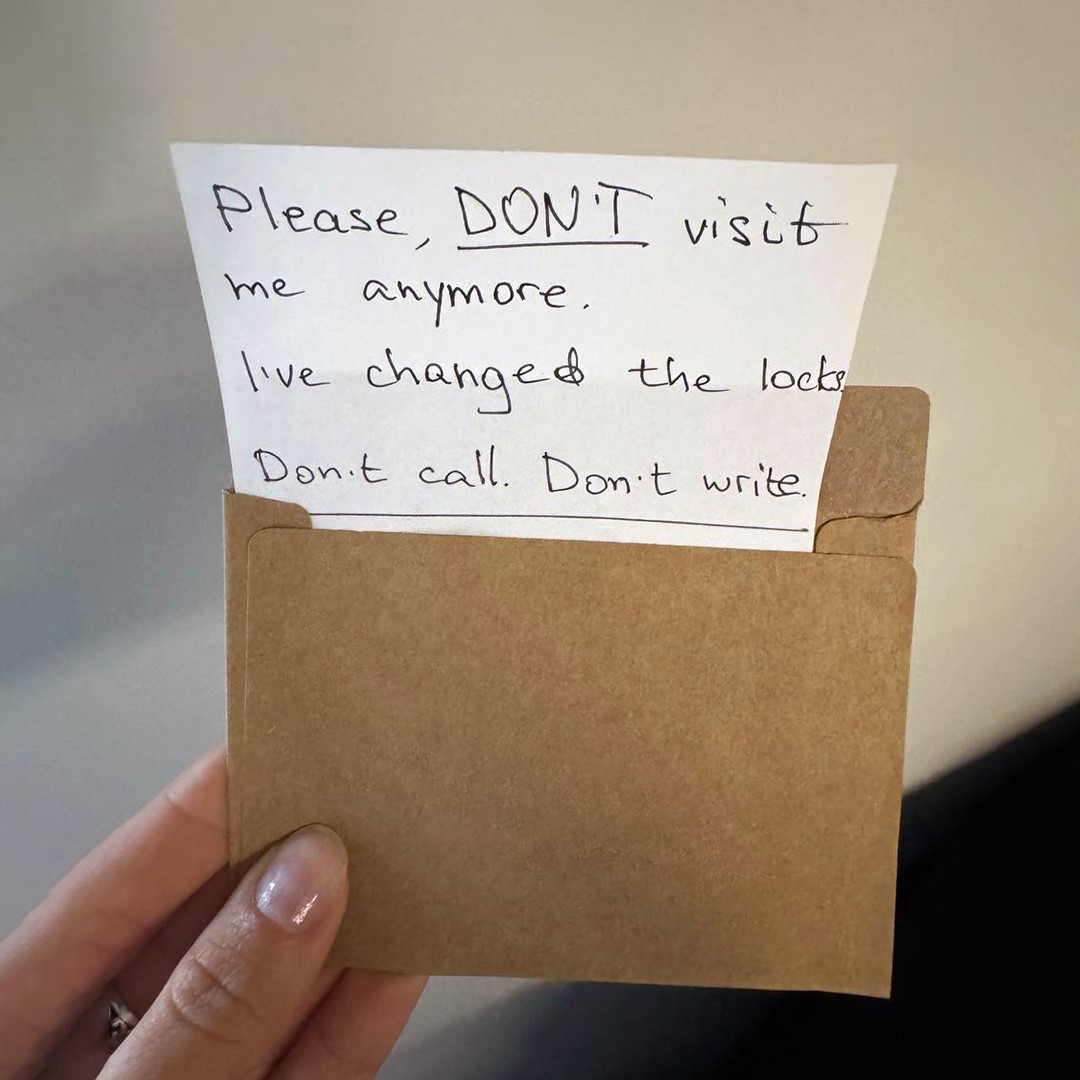My Grandma Sent Me a Letter Telling Me Never to Visit Again. When I Found Out Why, My Heart Broke in Ways I Can’t Explain.

It came in a plain white envelope, no return address—just my name in Grandma’s familiar, flowing script. Her letters always brought a smile to my face. Among the bills and junk mail, hers felt like a warm hug. But the moment I opened it, everything changed.
“Please don’t come see me anymore. I’ve changed the locks. I need peace and space now. Don’t call. Don’t write. Just let me be.”
I read the lines over and over, disbelief flooding every corner of me. My hands trembled, the paper shaking like it carried a storm. Just last week, we were baking cookies together. She hugged me tight, kissed my cheek, laughed like always. Nothing—absolutely nothing—had seemed off.
I called my older sister immediately. “Jenna, did you get a letter from Grandma?”
“Yeah,” she said flatly. “Same thing. She doesn’t want visitors. Guess she needs to be left alone.”
“That doesn’t make sense,” I said. “She’s never been that way.”
“Maybe she’s just tired of us,” Jenna muttered. “I have a meeting. Talk later.”
The chill in her voice hit harder than I expected. Next, I called Marie, our youngest sister. Her voice cracked before I even finished asking.
“I don’t get it,” she whispered. “I tried calling Grandma, but it goes straight to voicemail. Claire… something’s wrong.”
“I’m going over there tomorrow,” I said firmly.
“But… she asked us not to.”
“I know what she said. But I also know her.”
The next morning, I drove the familiar route to Grandma’s little blue house, banana bread still warm in my passenger seat. Everything outside looked the same—garden tidy, porch swing swaying, wind chimes dancing in the breeze. But something felt off. The curtains were all drawn. No signs of life.
I tried my key. It didn’t work. She really had changed the locks. I knocked. No answer.
I sat in my car, parked half a block down, unsure what I was even waiting for—until Jenna’s truck pulled into the driveway. I watched her get out, calm as anything, and unlock the front door with a key from her purse.
My heart stopped.
We all got the same letter. So why did Jenna have access?
I waited five minutes before walking up to the door and knocking hard. Jenna answered, startled.
“What are you doing here?” she asked, defensive.
“I was about to ask you the same thing.” I stepped past her.
In the living room, Grandma sat wrapped in a shawl on the couch, a blanket around her shoulders, her knitting untouched beside her. She looked smaller, thinner—older.
Her eyes found mine. They lit up.
“Claire? Oh, honey, you came?”
I rushed to her. “Of course. Grandma, why would you send me that letter?”
She blinked, confused. “What letter?”
I froze. “You didn’t write it?”
Behind me, Jenna stiffened. Grandma’s voice trembled. “Jenna told me you girls were too busy. That you didn’t want to visit anymore.”
I turned to her, cold horror blooming inside me. “You did this?”
“I… I had to,” Jenna said tightly. “She needs round-the-clock care. I quit my job, moved in, gave up everything. You think banana bread once a week is enough?”
“Then why not ask for help?” I shouted. “Why lie? Why isolate her?”
Jenna’s voice cracked. “She wouldn’t have signed the new will otherwise.”
Grandma flinched. “New will?”
Silence.
“I thought those were insurance papers,” she said weakly. “You said it was for my safety.”
Tears blurred my vision. “You lied to all of us,” I whispered. “You made her think we abandoned her. You forged letters. You changed legal documents behind her back.”
“I was trying to help,” Jenna said, but her voice was barely a whisper now.
“No,” I snapped. “You were trying to control everything.”
Grandma’s voice was soft but firm. “You hurt me, Jenna. I thought my girls left me. I cried every night.”
I took out my phone. “I’m calling Marie. And then a lawyer.”
Jenna didn’t stop me.
That night, Marie came over with dinner and red-rimmed eyes. We showed Grandma the letters. She broke down, holding each of us like lifelines.
The lawyer arrived three days later. The fraudulent will was destroyed, replaced by the original. A new clause was added: anyone caught manipulating or deceiving her would be permanently removed from all inheritance.
Jenna didn’t argue. She stayed, quietly, in the background.
But something fundamental had shifted.
Grandma had grieved us while we were still alive. And that kind of wound doesn’t heal with an apology.
From then on, Marie and I took turns visiting daily. We created a schedule, shared responsibilities. Slowly, Grandma’s sparkle returned. Her laughter came more easily. But some days, she still stared at the door as if waiting for something—or someone—who might not come.
Jenna remained in the house, trying to rebuild the trust she’d broken. Some days, Grandma let her help. Other days, she quietly asked her to step out of the room.
One afternoon, as we folded laundry together, I asked, “Do you think you’ll ever forgive her?”
Grandma nodded gently. “Forgiveness comes easy, Claire. It’s trust that doesn’t grow back the same.”
She squeezed my hand. “Just promise me this—don’t let what happened pull you girls apart. Family is fragile. Too precious to lose.”
I couldn’t promise that. Not yet. But I made another vow—to speak up sooner. To never again let silence, guilt, or convenience rob me of the people I love.
Some letters can’t be unsent. Some trust can’t be restored. But from the ashes of betrayal, sometimes—if you’re willing—you can start writing something new.